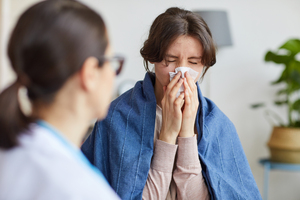Key points
- Vaccines train your immune system to prevent serious illnesses like flu, COVID-19, RSV, and pneumonia.
- Most vaccines are over 85% effective and undergo rigorous safety testing.
- Mild side effects are common; serious reactions are extremely rare.
- Vaccination schedules vary by age, with key updates for children, adults, and seniors.
- Vaccines are available at pharmacies, urgent care clinics, and primary care providers.

According to the World Health Organization (WHO), 2 to 3 million deaths are prevented each year thanks to vaccination. An additional 1.5 million lives could be saved with broader access to vaccines. These numbers underscore just how vital immunization is to public health. Yet, despite this overwhelming evidence, some people remain uncertain about vaccine safety and efficacy.
With new vaccines released in recent years—such as those for COVID-19 and RSV—and updates to others like the flu and pneumococcal vaccines, it’s important to stay informed. This article covers how vaccines work, which ones you and your family may need, and what to know about side effects, safety, and scheduling.
What are vaccines?
Vaccines are medical tools designed to protect people from infectious diseases. They work by training your immune system to recognize and fight off harmful viruses or bacteria before they cause illness. Because of vaccines, diseases like measles, polio, and whooping cough are now rare in many parts of the world.
Modern vaccines, including those for COVID-19 and RSV, are developed using advanced scientific methods and must pass rigorous safety and effectiveness testing before being approved.
How do vaccines work?
Vaccines introduce a harmless part or version of a virus or bacterium to your immune system. This might be a weakened virus, an inactivated piece, or a protein that mimics it. The immune system responds by producing antibodies—special proteins that help fight off the real infection if it appears in the future.
Some vaccines provide lifelong protection with just a few doses. Others, such as the flu and COVID-19 vaccines, are updated periodically and may require annual boosters to stay effective against evolving strains.
How effective are vaccines?
Vaccines are highly effective in preventing disease, and their success is backed by decades of research. Most vaccines reduce the risk of infection by 85-99%, significantly lowering the likelihood of severe illness and hospitalization.
Common Vaccines and Their Efficacy:
- Measles, Mumps, and Rubella (MMR) – 97% effective after two doses
- Diphtheria, Tetanus, and Pertussis (DTaP/Tdap) – 95% effective
- Polio vaccine – 99% effective after four doses
- Influenza (Flu) vaccine – Varies each year, typically 40-60% effective
- COVID-19 vaccine – 80-90% effective at preventing severe illness and hospitalization
- Human Papillomavirus (HPV) vaccine – Nearly 100% effective in preventing HPV-related cancers
- Hepatitis B vaccine – 95% effective in preventing infection
- Pneumococcal vaccine – 85-90% effective in preventing severe disease
- RSV Vaccine (for adults 60+ and infants) – 70-85% effective at preventing severe RSV disease
- Shingles vaccine – 90% effective in preventing shingles in older adults
Are vaccines safe?
Yes. Vaccines are extensively tested in clinical trials involving tens of thousands of people and are continually monitored for safety after approval by agencies like the CDC and FDA.
Most side effects are minor—typically involving a sore arm, fatigue, or mild fever—and go away within a few days. Severe reactions are extremely rare. The benefits of vaccination far outweigh the risks, especially for vulnerable populations like young children, older adults, and those with chronic illnesses.
What are the potential side effects of vaccinations?
Most vaccine side effects are mild and temporary. They typically include redness or swelling at the injection site, low-grade fever, fatigue, or body aches. Severe allergic reactions are extremely rare, occurring in about 1 to 2 people per million doses.
COVID-19 vaccine side effects
Common side effects include arm soreness, fatigue, headache, mild fever, and muscle aches. Severe reactions are rare but may include allergic reactions or myocarditis (inflammation of the heart muscle) in young males.
DTaP vaccine side effects (Diphtheria, Tetanus, and Acellular Pertussis)
May cause mild fever, redness at the injection site, irritability, and tiredness. Serious reactions, like seizures or allergic reactions, are extremely rare.
Hepatitis vaccine side effects
Common reactions include arm soreness, mild fever, or fatigue. Severe reactions are very rare but could include allergic responses.
HPV vaccine side effects
Most common side effects are arm pain, dizziness, mild fever, or nausea. Fainting is possible, especially in teens, so it’s recommended to sit or lie down after vaccination.
Influenza vaccine side effects (flu vaccine)
Mild reactions include soreness at the injection site, fatigue, mild fever, or headache. Flu shots cannot give you the flu, but they may cause mild flu-like symptoms.
MMR vaccine side effects (Measles, Mumps, and Rubella)
Mild fever, rash, or temporary joint pain can occur. Severe reactions like allergic responses are very rare.
Pneumococcal vaccine side effects (Pneumonia)
Injection site redness, fatigue, or mild fever are the most common side effects. Severe reactions are rare.
Shingles vaccine side effects
Pain at the injection site, fatigue, muscle aches, and mild fever are common. Severe side effects are uncommon.
Varicella vaccine side effects (Chickenpox)
Mild rash, soreness at the injection site, or low fever may occur. Severe allergic reactions are rare.
How are vaccines approved for us?
All vaccines undergo a multi-phase approval process before they become available:
-
Laboratory Testing – To determine safety and immune response
-
Clinical Trials – Large-scale testing in human volunteers
-
FDA Approval – Based on safety and effectiveness data
-
Ongoing Monitoring – Through systems like VAERS (Vaccine Adverse Event Reporting System)
Even after approval, vaccines are continuously monitored for rare side effects and long-term effectiveness.
Who should get vaccinated?
Most people benefit from routine vaccinations, but specific recommendations vary by age, health condition, and risk factors.
Vaccination schedule for children (birth to age 6):
- RSV preventive antibodies (for infants born during RSV season or at high risk)
- Hepatitis B – Birth, 1-2 months, 6-18 months
- DTaP – 2, 4, 6, and 15-18 months, 4-6 years
- Polio (IPV) – 2, 4, 6-18 months, 4-6 years
- MMR – 12-15 months, 4-6 years
- Varicella (Chickenpox) – 12-15 months, 4-6 years
- Hib, Pneumococcal, Rotavirus, Hepatitis A – Various schedules
Vaccination schedule for children (ages 7-18):
- Tdap – 11-12 years
- HPV – 11-12 years (two doses)
- Meningococcal – 11-12 years, booster at 16 years
- Flu vaccine – Every year
- COVID-19 – Recommended only for children with high-risk conditions; consult your doctor
Vaccination schedule for adults (ages 19-49):
- Tdap/Td booster – Every 10 years
- Flu vaccine – Annually
- Pneumococcal – 19+ for high-risk individuals, or 50+ for everyone
- COVID-19 booster – For high-risk individuals only; talk to your healthcare provider
Vaccination schedule for older adults (ages 50+):
- Tdap/Td booster – Every 10 years
- Flu vaccine – Every year, high-dose or adjuvanted vaccine preferred for adults 65+
- COVID-19 – Annual booster recommended for adults 65+; others should consult their doctor if high-risk
- RSV – 50+ for high-risk individuals, or 75+ for everyone
- Shingles – Two doses, 2 to 6 months apart
- Pneumococcal – One dose of PCV20 at age 50+, or a series starting with PCV15 followed by PPSV23 1 year later (or sooner for high-risk individuals)
Can I delay my child’s vaccination schedule?
While some parents consider delaying or spacing out vaccinations, medical experts advise following the CDC’s recommended schedule. Delays can leave children vulnerable to preventable diseases during critical developmental periods.
Do you need vaccines to travel outside of the U.S.?
Many countries require specific vaccines before entry, and some destinations pose a higher risk of disease exposure.
Recommended travel vaccines:
-
Yellow Fever (Africa, South America)
-
Typhoid (Asia, Africa, Latin America)
-
Hepatitis A and B
-
Japanese Encephalitis
-
Rabies
Check the CDC’s travel health website for specific requirements based on your destination.
Where can you get vaccines?
Vaccines are widely available at healthcare providers, pharmacies, and urgent care centers. Many urgent care clinics offer walk-in vaccinations, making it quick and convenient to stay up to date. Check with your local provider for availability.
Vaccines are a cornerstone of modern medicine, saving millions of lives each year. Staying up to date with recommended vaccines—including flu, COVID-19, RSV, and pneumococcal—is one of the most effective ways to protect yourself, your family, and your community.
Have questions about what vaccines you or your child need? Speak with your healthcare provider or visit a local urgent care center to get started.
FAQs
What is the purpose of vaccines and how do they work?
Vaccines are medical tools designed to protect people from infectious diseases by training the immune system to recognize and fight off harmful viruses or bacteria before they cause illness. They introduce a harmless part or version of a virus or bacterium to your immune system, which then produces antibodies to help fight off the real infection if it appears in the future.
How effective and safe are vaccines?
Vaccines are highly effective in preventing disease, with most vaccines reducing the risk of infection by 85-99%. They are extensively tested in clinical trials and are continually monitored for safety after approval. Most side effects are minor and go away within a few days, with severe reactions being extremely rare.
What are the common side effects of vaccinations?
Common side effects of vaccinations typically include redness or swelling at the injection site, low-grade fever, fatigue, or body aches. Severe allergic reactions are extremely rare, occurring in about 1 to 2 people per million doses.
What is the recommended vaccination schedule for different age groups?
The recommended vaccination schedule varies by age, health condition, and risk factors. For instance, children from birth to age 6 are recommended to get vaccines for diseases like RSV, Hepatitis B, DTaP, Polio, MMR, and Varicella. Adults aged 19-49 are recommended to get Tdap/Td booster every 10 years, annual flu vaccine, and COVID-19 booster as recommended by the CDC. The specific schedule can be discussed with a healthcare provider.
Are there any specific vaccines required for travel outside of the U.S.?
Yes, many countries require specific vaccines before entry, and some destinations pose a higher risk of disease exposure. These vaccines may include Yellow Fever, Typhoid, Hepatitis A and B, Japanese Encephalitis, and Rabies. The specific requirements can be checked on the CDC’s travel health website.









